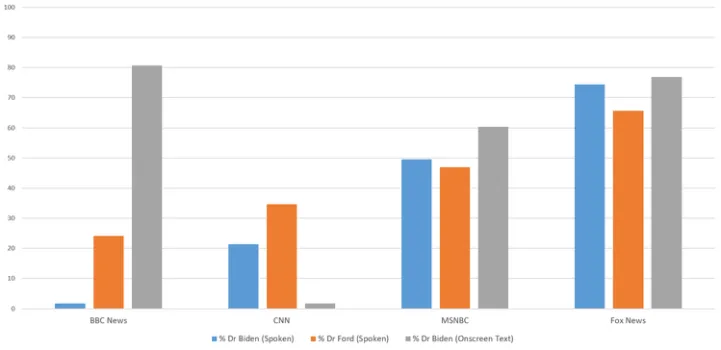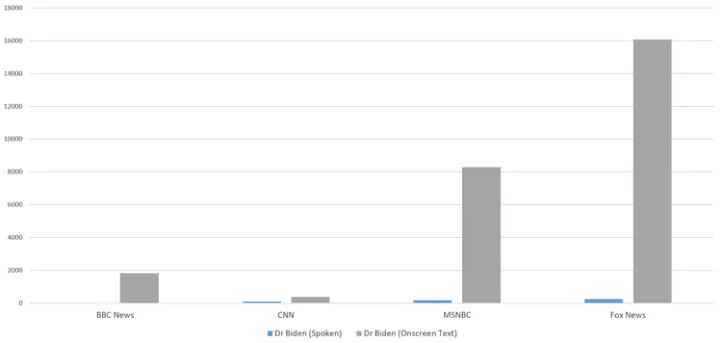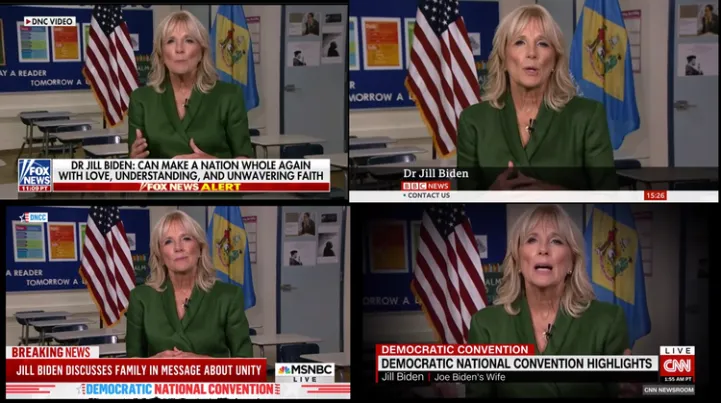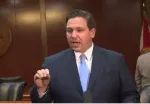Last week an opinion piece in the Wall Street Journal by Joseph Epstein provoked a heated debate over the use of the honorific “Dr.” by future first lady Jill Biden when the writer suggested that only medical doctors should use the courtesy title, rather than anyone with a doctorate. The op-ed drew considerable backlash, with widespread support expressed across news outlets and among the punditry for her use of the prefix. Yet, a close examination of media coverage of Jill Biden over the course of this year suggests that for all their outrage, some of the very media outlets most critical of the op-ed have themselves consistently omitted her preferred title.
The debate over whether all doctorate holders should be referred to as “Dr.” isn’t new. In 2018 some news outlets, including NPR, declined to use the prefix in referring to Brett Kavanaugh accuser Christine Blasey Ford. In the words of NPR’s standards editor at the time, “the idea is that for most listeners a ‘Dr.’ practices medicine.”
Nor is the debate over “Dr. Biden” itself a new one. Her use of the title prompted a similar debate when she became the second lady in 2009, with journalists noting that her predecessor Lynne Cheney also held a doctorate but chose not to use the honorific. The Washington Post’s copy desk chief was quoted at the time as saying, “My feeling is if you can’t heal the sick, we don’t call you doctor” – Epstein’s words almost verbatim. The Los Angeles Times clarified to its readers that “newspapers, including The Times, generally do not use the honorific ‘Dr.’ unless the person in question has a medical degree”; as such, the Times declined to address Biden this way.
In the past week, the Washington Post ran a series of articles arguing that PhDs should be addressed as “Dr.” Yet just three years ago the Post ridiculed White House adviser Sebastian Gorka for using the title despite only having a PhD. The piece was headlined, “Sebastian Gorka likes to be called ‘Dr. Gorka.’ He gets his way only in conservative media.” The Post noted that “mainstream news outlets generally refuse to attribute the ‘Dr.’ prefix to anyone who is not a medical doctor.”
The question of when to use the honorific is typically codified by news organizations’ style guides. For example, the BBC’s explicitly argues against using the term for politicians with non-science degrees. The Associated Press’ style guide stipulates, “Use Dr. on first reference as a formal title before the name of an individual who holds a doctor of dental surgery, doctor of medicine, doctor of optometry, doctor of osteopathic medicine, doctor of podiatric medicine, or doctor of veterinary medicine.” The New York Times’ style guide “allows for anyone with an earned doctorate, such as a Ph.D. or Ed.D., to be identified by the title … provided it is ‘germane to the holder’s primary current occupation.’”
In its response to the controversy, the Journal noted that its editorial page style is to use “Dr.” only to refer to medical doctors. Despite CNN publishing several pieces criticizing the WSJ op-ed, it too acknowledged that “CNN’s longtime policy only refers to medical doctors as ‘Dr.’ in its reporting, per its stylebook.”
The real question is how these policies translate into coverage.
Television news offers two distinct dimensions through which to compare the use of “Dr.” in reference to the future first lady. The first is through the spoken word transcriptions of each broadcast, which capture how anchors, personalities and guests have described her. The second is through the on-screen text, which includes the “crawl” at the bottom of the screen (showing top headlines) and the chyron (the text in the lower third of the screen showing the name, title and affiliation of guests) as well as any other text being displayed at the moment. How often do speakers refer to Jill Biden as “Dr. Biden” and, more importantly, how often is she titled as “Dr.” on-screen?
To examine these two measures, the Internet Archive’s Television News Archive was used to compare spoken word and textual mentions of “Jill Biden” versus “Dr. Biden” and “Dr. Jill Biden” across BBC News London, CNN, MSNBC and Fox News from Jan. 1, 2020 through Dec. 13, 2020. For comparison purposes, spoken word mentions of “Ford” (with a set of terms to exclude Ford Motor Co., etc.) versus “Dr. Ford” were compared from Aug. 1, 2018 through Oct. 31, 2018 (on-screen text search is not available from this period).
The results can be seen in the chart below, showing the percentage of mentions that used “Dr.” Other than on-screen references to “Dr. Biden,” Fox News was the leader in all three categories. The effects of CNN’s policy against using “Dr.” when referring to doctorate holders is starkly visible, but there appears to be less effect on spoken word mentions.

(For those interested in diving into the data points, you can jump directly to the live graphs: “Jill Biden” spoken word, “Dr. Biden” spoken word, “Ford” spoken word, “Dr. Ford” spoken word, “Jill Biden” on-screen text, “Dr. Biden” on-screen text.)
At the same time, the graph above is skewed by the fact that some stations mentioned Biden more than others. For example, CNN mentioned “Dr. Jill Biden” or “Dr. Biden” just 86 times this year out of 402 mentions of “Jill Biden,” yielding a 23% “Dr.” rate, while Fox News mentioned “Dr. Biden” almost three times as often.
To capture this relative disparity more clearly, the graph below shows the same data as above, but displays the raw seconds of airtime rather than the percentage of mentions (Ford is not included in this graph because measurement of airtime seconds is not available prior to 2020). Fox News has displayed “Dr. Biden” more than 4.45 hours this year, followed by just 2.3 hours on MSNBC, 30 minutes on BBC News London and a mere six minutes on CNN.

Most of the mentions on Fox News come from two events. The first was an interview Jill Biden gave with Dana Perino on Aug. 4 in which the chyrons titled her as “Dr. Jill Biden.” The second was its coverage of the Democratic National Convention in which it again largely billed her as “Dr.” In airing the exact same clip, BBC also used “Dr. Jill Biden” while MSNBC labeled her as “Jill Biden” and CNN relegated her to merely “Joe Biden’s Wife” (though in other airings it did use other identifiers such as “Dr. Jill Biden Wife of Joe Biden.” Titles changed over the course of the convention, with excerpts of Biden’s speech rebroadcast on MSNBC attributed to “Dr. Jill Biden” and a separate interview identified her as “Fmr. Second Lady of the United States.”
The four very different takes on Biden’s speech can be seen in its entirety here:

In the end, instead of moral outrage, media outlets should perhaps use this moment to reflect back on their own editorial policies and histories. Those that today decry the Journal might wish to ask whether their own policies are in need of updating when they saw nothing wrong just a few months ago relegating Biden to merely being the candidate’s “wife.”







